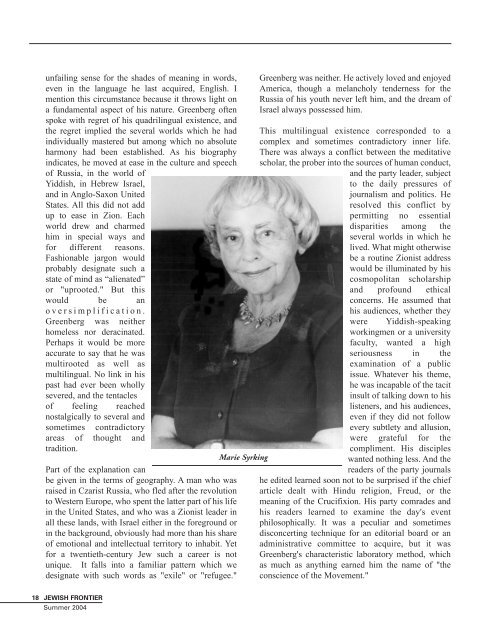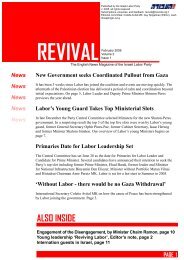You also want an ePaper? Increase the reach of your titles
YUMPU automatically turns print PDFs into web optimized ePapers that Google loves.
unfailing sense for the shades of meaning in words,<br />
even in the language he last acquired, English. I<br />
mention this circumstance because it throws light on<br />
a fundamental aspect of his nature. Greenberg often<br />
spoke with regret of his quadrilingual existence, and<br />
the regret implied the several worlds which he had<br />
individually mastered but among which no absolute<br />
harmony had been established. As his biography<br />
indicates, he moved at ease in the culture and speech<br />
of Russia, in the world of<br />
Yiddish, in Hebrew Israel,<br />
and in Anglo-Saxon United<br />
States. All this did not add<br />
up to ease in Zion. Each<br />
world drew and charmed<br />
him in special ways and<br />
for different reasons.<br />
Fashionable jargon would<br />
probably designate such a<br />
state of mind as “alienated”<br />
or "uprooted." But this<br />
would be an<br />
oversimplification.<br />
Greenberg was neither<br />
homeless nor deracinated.<br />
Perhaps it would be more<br />
accurate to say that he was<br />
multirooted as well as<br />
multilingual. No link in his<br />
past had ever been wholly<br />
severed, and the tentacles<br />
of feeling reached<br />
nostalgically to several and<br />
sometimes contradictory<br />
areas of thought and<br />
tradition.<br />
Part of the explanation can<br />
be given in the terms of geography. A man who was<br />
raised in Czarist Russia, who fled after the revolution<br />
to Western Europe, who spent the latter part of his life<br />
in the United States, and who was a Zionist leader in<br />
all these lands, with Israel either in the foreground or<br />
in the background, obviously had more than his share<br />
of emotional and intellectual territory to inhabit. Yet<br />
for a twentieth-century Jew such a career is not<br />
unique. It falls into a familiar pattern which we<br />
designate with such words as "exile" or "refugee."<br />
Marie Syrking<br />
Greenberg was neither. He actively loved and enjoyed<br />
America, though a melancholy tenderness for the<br />
Russia of his youth never left him, and the dream of<br />
Israel always possessed him.<br />
This multilingual existence corresponded to a<br />
complex and sometimes contradictory inner life.<br />
There was always a conflict between the meditative<br />
scholar, the prober into the sources of human conduct,<br />
and the party leader, subject<br />
to the daily pressures of<br />
journalism and politics. He<br />
resolved this conflict by<br />
permitting no essential<br />
disparities among the<br />
several worlds in which he<br />
lived. What might otherwise<br />
be a routine Zionist address<br />
would be illuminated by his<br />
cosmopolitan scholarship<br />
and profound ethical<br />
concerns. He assumed that<br />
his audiences, whether they<br />
were Yiddish-speaking<br />
workingmen or a university<br />
faculty, wanted a high<br />
seriousness in the<br />
examination of a public<br />
issue. Whatever his theme,<br />
he was incapable of the tacit<br />
insult of talking down to his<br />
listeners, and his audiences,<br />
even if they did not follow<br />
every subtlety and allusion,<br />
were grateful for the<br />
compliment. His disciples<br />
wanted nothing less. And the<br />
readers of the party journals<br />
he edited learned soon not to be surprised if the chief<br />
article dealt with Hindu religion, Freud, or the<br />
meaning of the Crucifixion. His party comrades and<br />
his readers learned to examine the day's event<br />
philosophically. It was a peculiar and sometimes<br />
disconcerting technique for an editorial board or an<br />
administrative committee to acquire, but it was<br />
Greenberg's characteristic laboratory method, which<br />
as much as anything earned him the name of "the<br />
conscience of the Movement."<br />
18 JEWISH FRONTIER<br />
Summer 2004




